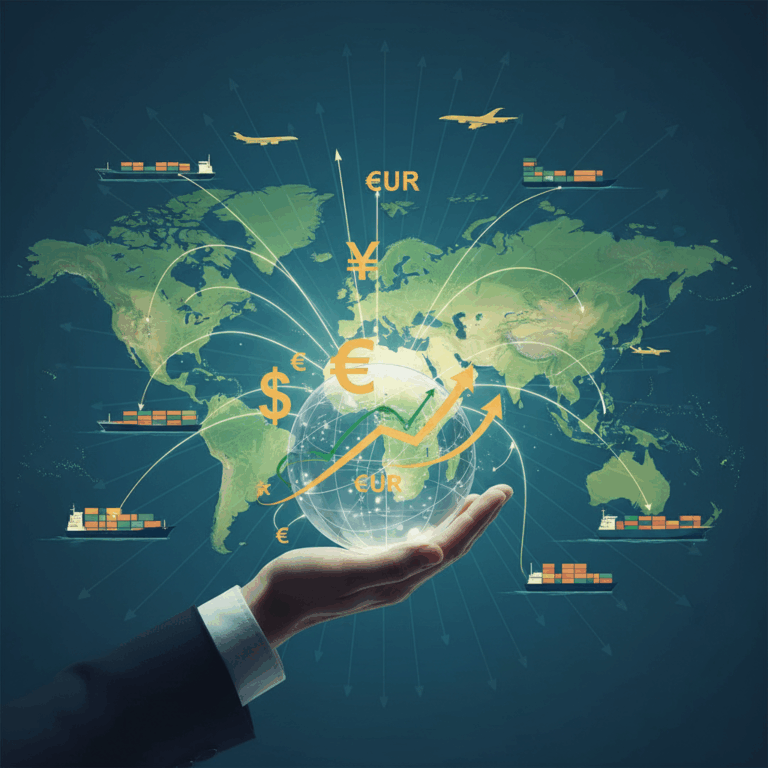Benefits of international trade
He international trade It fosters economic growth by enabling countries to access broader global markets. This generates higher incomes and expands business opportunities.
Furthermore, by integrating different economies, innovation and competition are fostered, which contributes to improving efficiency and productivity in different sectors worldwide.
Access to expanded markets and increased income
Thanks to international trade, countries can sell their products and services to a much wider customer base, which significantly increases their revenue.
This allows companies to grow, create jobs, and strengthen the national economy by opening up to opportunities that would not exist in a limited market.
Furthermore, market diversification reduces vulnerability to local economic crises, providing greater stability and economic resilience.
Variety and improved quality for consumers
Consumers benefit from a greater variety of goods and services, often of better quality and more competitive prices due to global competition.
This diversity not only better satisfies needs and preferences, but also improves overall well-being by facilitating access to innovative products.
The transfer of technology and knowledge drives continuous improvement in production and supply standards, consolidating these benefits for end users.
Key factors driving international trade
He international trade It is based on various factors that generate efficiency and economic growth. These elements allow countries to compete and prosper in a global market.
Thus, specialization, competition, and risk diversification are fundamental to the expansion and stability of economies worldwide.
Specialization and comparative advantages
Specialization allows countries to focus on producing goods and services where they have the greatest potential. comparative advantagesincreasing overall efficiency.
This strategy increases productivity and optimizes the use of resources, making it easier for each nation to participate in the international market with its best products.
As a result, trade becomes more competitive and dynamic, fostering more balanced and sustainable economic growth.
Competition, innovation and technology transfer
International competition encourages companies to innovateto improve quality and reduce costs in order to remain successful in the global market.
Furthermore, technology transfer between countries promotes the adoption of new practices and tools, strengthening productive capacity.
These dynamics generate a continuous cycle of improvement that benefits producers and consumers in all regions involved.
Job creation and economic strengthening
International trade expands the demand for labor in associated sectors such as production, logistics, and services, generating employment.
This increase in employment contributes to the strengthening of the national economy and the reduction of unemployment, favoring social and economic development.
Likewise, productive modernization thanks to external investments improves competitiveness and the quality of jobs.
Diversification of economic risks
By accessing multiple markets, countries can diversify their sources of income and reduce the vulnerability facing internal economic crises.
This diversification allows for greater economic stability and resilience to fluctuations or problems in specific markets.
Thus, international trade not only increases opportunities, but also protects the economy against global uncertainties.
Impact on investment and productive development
He international trade It facilitates the arrival of foreign direct investment, which is essential for the modernization of productive sectors in countries.
This investment promotes technology transfer and talent development, strengthening productive and competitive capacity at a global level.
Foreign direct investment and modernization
Foreign direct investment generates resources and knowledge to modernize local infrastructure and production processes.
This promotes greater efficiency, innovation and quality in production, fostering sustainable economic development.
Furthermore, the presence of international companies fosters a competitive environment that encourages constant improvements in the productive sector.
Improved tax collection and social welfare
The increase in economic activity resulting from trade and investment contributes to raising tax revenues in countries.
These additional resources can be allocated to social programs and public services, improving the overall well-being of the population.
Thus, trade not only boosts the economy, but also strengthens social development and the quality of life of citizens.
General contributions to global growth
He international trade It is a key driver of global economic growth, as it fosters competitiveness and contributes to the sustainable development of participating countries.
Through integration and cooperation between nations, benefits are achieved that enhance economic and social development in a globalized context.
Promoting competitiveness and sustainable development
Trade drives competitiveness by requiring companies to innovate and continually improve their products and processes, thereby strengthening markets worldwide.
This dynamic promotes sustainable development by encouraging responsible practices and the efficient use of resources, balancing growth and environmental care.
Furthermore, technology transfer and productivity improvements resulting from trade strengthen countries' ability to grow sustainably.
Increased opportunities and quality of life
The expansion of international trade generates greater access to goods, services and employment, thus improving the quality of life of populations around the world.
By diversifying markets and economic relationships, development opportunities are expanded, allowing more people to benefit from global growth.
In this way, international trade contributes to reducing poverty and promotes broader and more equitable social well-being.






